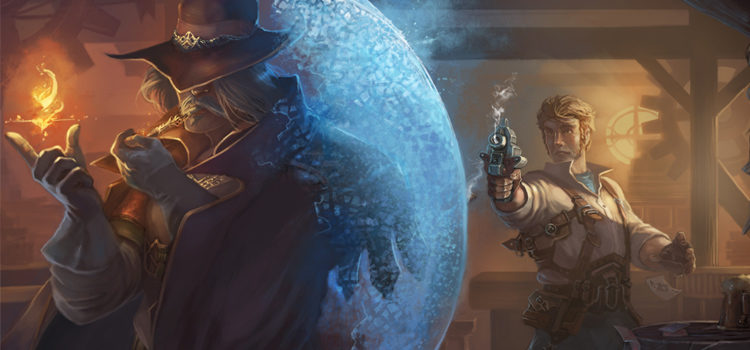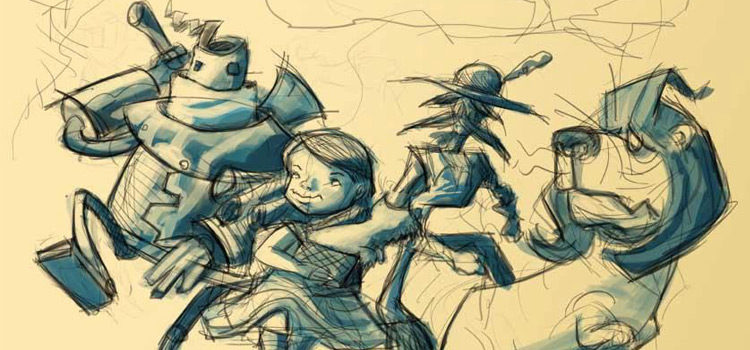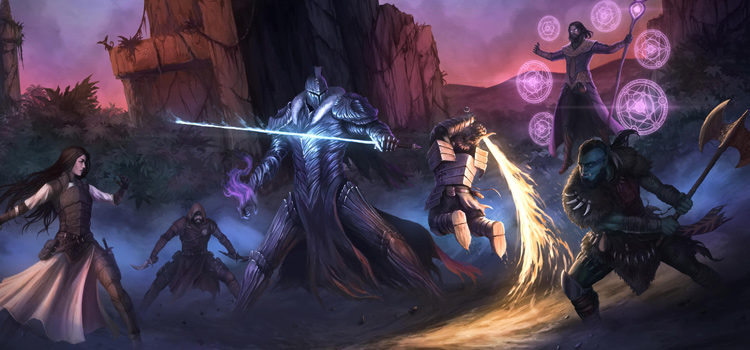Best Feats You Should Consider for Your Rogue (D&D 5e)
This post may contain affiliate links. If you buy something we may get a small commission at no extra cost to you. (Learn more).
The rogue — class of stealth, subterfuge, and skill, navigating the seedy underbelly of the world of Dungeons & Dragons. The archetypal rogue feels right at home with their slippery fingers purging a mark’s pockets, deftly using their thieves’ tools to unlock safes or disarm traps, or hiding and waiting in the cover of darkness for the right opportunity to strike at their foes.
Outside of combat, their Expertise class feature gives them a lot of versatility.
They can range from being great scouts, able to slip in and out of enemy territory unnoticed, to charismatic tricksters, using their charm and duplicity against hapless NPCs – or even to smart alecks who can recall the right piece of information at the right time.
In combat, they are huge single-target damage dealers thanks to their class feature, Sneak Attack, and have abilities like Cunning Action, Uncanny Dodge, and Evasion that give them a little more survivability.
Unlike martial classes, however, rogues don’t get Extra Attack.
Which means they have to make their singular attack count. With decent planning and positioning, rogues are slippery forces to be reckoned with, but sometimes plans don’t survive first contact.
If your DM is using the variant rule that allows you to nab feats in place of an Ability Score Increase, then maybe you should consider feats to make you better at one or the other.
Rogues get six ASI’s in their feature list — one more than all the other classes’ five — allowing you to spare an ASI or two for the following feats.
Combat Feats
Crossbow Expert
Crossbows are arguably one of the rogue’s more iconic weapons, and this feat makes them much more effective in battle.
By taking this feat, you can ignore the loading property of crossbows and can fire them more than once per turn, you don’t suffer disadvantage on ranged attack rolls when an enemy is within 5 feet of you, and you can fire a hand crossbow as a bonus action if you attack with a one-handed weapon on your turn (and yes, that also includes hand crossbows themselves).
This is a must-pick for any rogue who wants a hand crossbow as their primary weapon, as this allows them to attack twice (albeit using both their action and their bonus action to do so), giving them more chances to land their Sneak Attacks.
Defensive Duelist
The clue’s in the name; this is a good defensive feat.
This feat allows you to, while wielding a weapon with the finesse property that you are proficient with, use your reaction to add a +2 to your AC when a creature hits you with a melee attack, potentially causing it to miss.
Melee rogues generally wield finesse weapons such as daggers, shortswords, and rapiers already, as rogues are a Dexterity-based class.
Taking this feat is a good way to avoid damage entirely, especially in situations where Uncanny Dodge may not be enough to save you from a world of hurt.
Dual Wielder
Dual Wielder gives those who wield two separate melee weapons in each hand a +1 bonus to their AC.
It also allows them to pull out two melee weapons simultaneously, as well as dual wield one-handed melee weapons without the light property.
Rogues who choose to go melee tend to gravitate towards two-weapon fighting, but commonly run into the limit of only being able to draw one weapon at a time per turn, which this feat fixes. Rogues are only proficient in light armor, so they have a naturally lower AC compared to their more armored compatriots.
This feat boosts the survivability of melee rogues through the AC bonus.
Elven Accuracy (Xanathar’s Guide to Everything)
Rogues rely on advantage as one of their conditions for Sneak Attack, but sometimes the roll of the dice just isn’t in your favor and you end up missing regardless.
With Elven Accuracy, you get to increase your Dexterity, Intelligence, Wisdom, or Charisma by +1, making it equivalent to half an ASI.
You also get to roll three dice instead of two and pick the higher result when you gain advantage on your attack rolls.
If your character happens to be an elf or a half-elf, then consider nabbing this feat. This massively ups your chances of landing a hit with advantage, which you’ll be looking to constantly get with your Cunning Action.
Mobile
In the blink of an eye, your foes may find you right beside them. Mobile grants you a +10 bonus to your movement speed, as well as the ability to not trigger AO when moving out of an enemy’s reach if you attack them during your turn.
This is a very useful feat for melee rogues, allowing them to deftly dip in and out of danger as they move in for their attacks and leave unharmed.
Piercer (Tasha’s Cauldron of Everything)
Pierce through your foes and make it hurt.
The Piercer feat is another half-ASI feat that increases either your Strength or Dexterity by +1.
It also allows you to reroll one of your attack’s damage die, and roll an additional damage die if you score a critical hit.
If you’re looking to push your abilities as well as your damage output up, then this is a good feat for both melee and ranged rogues as the optimal weapons for rogues to use already deal piercing damage.
Sharpshooter
Enemies will learn to fear your unerring eye and bolt.
Sharpshooter allows you to attack at long range without suffering disadvantage and ignore both ½ and ¾ cover when making ranged weapon attacks.
Also included is a high-risk, high-reward component: you can choose to take a -5 penalty to your ranged attack rolls in exchange for a +10 to your damage rolls.
The -5 penalty is an easier pill to swallow with the advantages on attack rolls you get by hiding around as a rogue using your Cunning Action.
Utility Feats
Actor
It’s all in the method.
Actor increases your Charisma by +1, gives you advantage on Deception and Performance checks to pass off as somebody else, and allows you to impersonate someone after observing them for a minute.
This makes the Rogue an excellent chameleon for social-intrigue scenarios in your games, especially when combined with Expertises in both of those skills making you a master at disappearing into a role.
Dungeon Delver
You have a sixth sense regarding dungeon dangers and secrets.
Dungeon Delver gives you advantage on Investigation and Perception checks to look for hidden passages, advantage on saving throws against traps, resistance to damage dealt by those traps, and removes the -5 penalty to your passive Perception when traveling at a fast pace.
This isn’t just excellent for dungeon crawls, though.
A lot of these benefits extend outside of the dungeon too. Traps and hidden passages are plentiful out in the open world, and fast-pace traveling without the passive Perception penalty can keep your group ready for any threats, especially when paired with the Observant feat.
Keen Mind
If you don’t want to bother yourself with taking notes and want to use your DM as your personal encyclopedia, then this feat is for you.
Keen Mind gives you a +1 to your Intelligence, gives your permanent knowledge of where north is, lets you know when exactly sunrise and sunset is at all times, and allows you to recall everything you’ve seen or heard within the month.
Observant
An open eye makes for closed wounds.
Observant increases your Wisdom by +1, allows you to read lips, and increases your passive Perception by +5.
It’s a great feat for both intrigue and exploration.
Reading lips can clue you in on private, pertinent information being whispered, and exploration benefits from having a party member who can catch hidden elements with their high passive Perception.
Skill Expert (Tasha’s Cauldron of Everything)
Skill Expert increases one ability score of your choice by +1, gives you an additional skill proficiency, and gives you Expertise with another skill you’re already proficient in.
Rogues are already excellent skill monkeys – which is only further strengthened by taking this feat to give yourself yet another set of skills and Expertise.
Special Mention Feats
Alert
Always be ready for action.
Alert gives you a +5 bonus to initiative rolls, removes your ability to be surprised while conscious, and removes enemies’ advantage on attack rolls against you while they are hidden.
Surprisingly, a rogue might not want to act first in combat.
Acting before everyone else means that the rest of your party won’t get to position themselves for you to get Sneak Attack, and thus your first turn may end up being suboptimal.
However, this is a must-pick for rogues who have taken the Assassin subclass.
Their Assassinate feature gives them advantage on all enemies who haven’t taken their first turn in combat, necessitating that Assassins act before everyone else.
Lucky
Is it really the luck of the draw when you’re the one holding the cards?
You get a pool of three luck points that you regain all expended uses of at a long rest. You can use these points to reroll any of your attack rolls, ability checks, or saving throws, as well as reroll an attack roll made against you.
Lucky is just one of those feats that’s just a good pick no matter what.
There’s no downsides to picking this.






